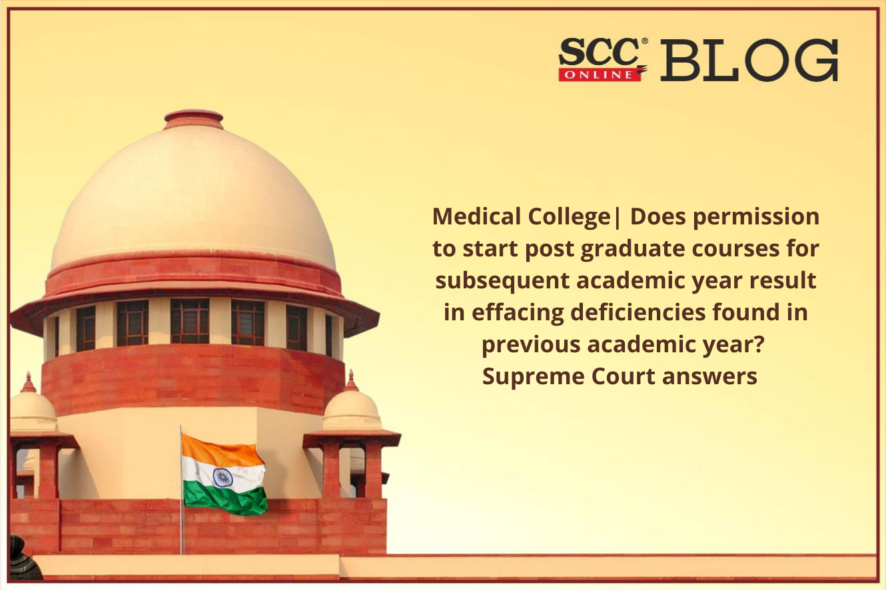Supreme Court: The Division Bench of L. Nageswara Rao and B.R. Gavai*, JJ., held that the permission granted to start Post Graduate course for the upcoming academic year after removal of deficiency cannot efface the deficiencies that were found in the previous academic year. Holding the impugned concurrent findings of the Courts below per incuriam, i.e. being passed in complete disregard of relevant judicial precedent, the Bench remarked,
“We are at pains to say that though the judgment in the case of Ayurved Shastra Seva Mandal (supra) was specifically relied on by the appellant herein, the learned Single Judge and the Division Bench of the High Court of Karnataka have chosen to rely on the earlier judgments of the Division Bench of the same High Court rather than a judgment of this Court.”
The Karnataka Ayurveda Medical College (respondent) had applied to the Central Council for Indian Medicine (appellant) for permission to start Post Graduate course for the academic year 2014-15. The appellant granted permission to start five new Post Graduate Ayurvedic disciplines with five seats each in accordance with the then prevalent Indian Medicine Central Council (Post-Graduate Ayurveda Education) Regulations, 2012 which was superseded by the Regulations, 2016.
Consequently, the central government directed the appellant to inspect the facilities available with the respondent in accordance with the relevant Regulations and submit its recommendations and the inspection report to it. The appellant inspected the facilities available with the respondent and pointed out certain deficiencies. Accordingly, a notice was issued to the respondent by central government and after hearing the respondent the central government rejected permission to admit students to the Post Graduate courses for the academic year 2018-19 on the ground of non availability of Central Research Laboratory and Animal House as mandated by the Regulations, 2016.
Findings of the High Court
Aggrieved by the aforesaid decision of the central government, the respondent approached the Karnataka High Court; however in the interregnum, the central government granted permission to admit students for the Post Graduate Course for the academic year 2019-20. Consequently, the High Court, while relying on the decisions of the Division Bench of Karnataka High Court in Bahubali Vidyapeeths JV Mandal Gramin Ayurvedic Medical College v. Union of India, 2019 SCC OnLine Kar 3537 and Central Council of Indian Medicine v. Union of India, 2011 SCC OnLine Kar 1389, wherein it was held that if the permission was granted for the subsequent years, the benefit should enure in respect of the previous year also, allowed the said writ petition.
Issue before the Court
The appellant submitted that merely because for the subsequent academic year, the requirements were fulfilled, it could not efface the deficiencies that were found in the previous academic year since the minimum standards, as required, are to be fulfilled for the particular academic year and in the event, such minimum standards are not fulfilled, the institution would not be entitled for permission for the relevant academic year. Hence, the appellant argued that the view taken by the High Court did not lay down a correct proposition of law.
Analysis and Findings
Chapter IIA containing Sections 13A to 13C by the Indian Medicine Central Council (Amendment) Act, 2003, which deals with “Permission for new Medical College, Course, etc.” lays downs that no medical college can open a new or higher course of study or training, including a postgraduate course, except with the previous permission of the Central Government. Similarly, Regulation 3(1)(a) of the 2016 Regulations specifically provides that the Ayurveda colleges established under Section 13A and existing under Section 13C and their attached hospitals shall fulfill the requirements of minimum standard for infrastructure and teaching and training facilities up to 31st December of every year for consideration of grant of permissions for undertaking admissions in the coming academic session.
Therefore, the Bench observed that if an institution is seeking grant of permission for undertaking admissions for the academic session 2022-23, it must fulfill the requirements of minimum standard as on 31st December 2021. Consequently, the Bench opined that the finding that the permission granted for a subsequent academic year would also enure to the benefit of earlier academic year though the said institution was not fulfilling the criteria of minimum standard was totally erroneous.
Reliance was placed by the Court on Ayurved Shastra Seva Mandal v. Union of India (2013) 16 SCC 696, wherein though the Court noted that a large number of students had applied for admission for the academic year 2011-12 with the leave of the Court, it was held that the privilege granted to the candidates could not be transformed into a right to be admitted in the course for which they had applied and the contention that since the deficiencies stood already removed and the permission was granted for the academic year 2012-13, the said permission should also be construed as having been granted for the academic year 2011-12, was rejected.
Hence, the Bench concluded that the High Court had grossly erred in not taking into consideration the scheme of the Act so also the judgment of the Supreme Court in the case of Ayurved Shastra Seva Mandal (supra). Accordingly, the impugned judgments and orders were quashed and set aside.
[Central Council for Indian Medicine v. Karnataka Ayurveda Medical College, 2022 SCC OnLine SC 437, decided on 11-04-2022]
*Judgment by: Justice B.R. Gavai
Appearance by:
For the Appellant: Aishwarya Bhati, ASG
For Union of India: Madhavi Divan, ASG
For the Respondent: Chinmay Deshpande, Advocate






